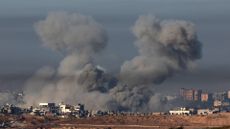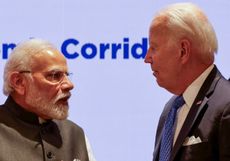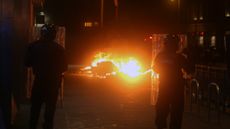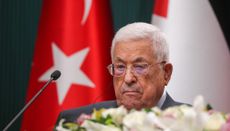How a long-term truce in Gaza could have ripple effects across the Middle East
Israel and Hamas have recently agreed to extend their peace for two more days
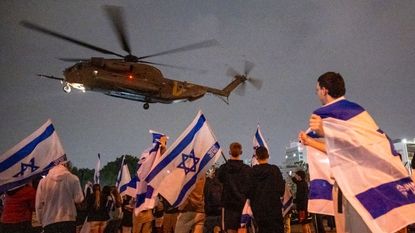

Israel and Hamas originally agreed to a four-day truce that would cease the fighting to allow for the release of hostages held by Hamas and Palestinian prisoners held by Israel. Both sides agreed to the temporary peace, and on Monday, it was announced that they had renegotiated the truce for an additional two days after pressure from numerous foreign countries, NGOs and diplomats.
Mediators of the deal, especially Qatar, said they were hopeful this could lead to a potential long-term cease-fire in the region. This is something that officials from both sides, including Israeli Prime Minister Benjamin Netanyahu and senior Hamas leadership, have left the door open to. The two-day extension would allow the release of 20 additional hostages from Hamas, a White House official told The Times of Israel, while the number of Palestinian prisoners that would be released by Israel is unclear.
This new deal could present an opening for mediators to hatch a longer pause in the violence. But if this continuing truce were to be extended into a long-term deal, what would it mean for Israel and Gaza? And beyond this, what would it mean for the Middle East as a whole?
Subscribe to The Week
Escape your echo chamber. Get the facts behind the news, plus analysis from multiple perspectives.

Sign up for The Week's Free Newsletters
From our morning news briefing to a weekly Good News Newsletter, get the best of The Week delivered directly to your inbox.
From our morning news briefing to a weekly Good News Newsletter, get the best of The Week delivered directly to your inbox.
Strategic problems for both sides
The details of the short-term extension are still being hashed out, but Israeli government spokesperson Eylon Levy previously wrote on X, formerly Twitter, that the terrorist group "can extend that pause by a day for every 10 hostages it gives us back."
President Joe Biden said during a press conference this weekend that it was "our goal to keep this pause going beyond tomorrow so that we can continue to see more hostages come out and surge more humanitarian relief into those in need in Gaza." But a long-term extension of the truce — and the exchange of hostages for prisoners — could "pose strategic problems for both Israel and Hamas," Christian Edwards wrote for CNN.
Part of the issue is that some of the hostages are held by other militant groups, such as the Palestinian Islamic Jihad, and not Hamas. But the ongoing agreement requires that Hamas, and not any other organization, hand over the hostages. As a result, "there is likely to be a limit to the number of hostages Hamas will be willing to free since it will be unwilling to surrender the leverage it has over Israel," Edwards wrote.
Given that Hamas' negotiating strength is almost totally based around the hostages, the group's promise to release them "has been the only thing that caused Israel to relent in seven weeks of fighting," Edwards added. And given Israel's push to have all the hostages freed, a long-term truce "might make its ultimate war aim — of destroying Hamas — harder to achieve," Edwards said.
Growing Qatari power
The most glaring effect of a long-term truce, though, could be the continued influence of Qatar on the overall state of Middle East affairs. The small nation was instrumental in brokering the refreshed cease-fire, and Qatari Prime Minister Mohammed bin Abdulrahman Al-Thani told the Financial Times he was hopeful that a long-term deal could be maintained.
The work between Qatar and Israel "marked an extraordinary moment for the two countries, which have no official diplomatic relations," Isabel Debre reported for The Associated Press. Qatar's influence in the deal "also underscored the major role of the tiny emirate in bridging differences between the enemies," Debre added.
This type of relationship "is something we've never seen before," Yoel Guzansky, a senior fellow at Tel Aviv's Institute for National Security Studies, told the AP. Qatar is also home to the Middle East's largest American military base, and as a result, is "uniquely positioned to break deadlocks in the cease-fire talks" that have also involved the U.S.
It is clear that Qatar is using its strategic location in the center of the region "to wield political influence and project soft power around the world," Debre wrote. Even prior to the extension's announcement, Qatar cemented itself "as Washington's preferred interlocutor with extremist groups and pariah states," Stephen Kalin wrote for The Wall Street Journal. However, a long-term deal could also present a risk to Qatar, Kalin added, as the country's "willingness to talk to extremist groups has left it open to allegations from its neighbors and others that it supports terrorism."

Continue reading for free
We hope you're enjoying The Week's refreshingly open-minded journalism.
Subscribed to The Week? Register your account with the same email as your subscription.
Sign up to our 10 Things You Need to Know Today newsletter
A free daily digest of the biggest news stories of the day - and the best features from our website
Justin Klawans has worked as a staff writer at The Week since 2022. He began his career covering local news before joining Newsweek as a breaking news reporter, where he wrote about politics, national and global affairs, business, crime, sports, film, television and other Hollywood news. Justin has also freelanced for outlets including Collider and United Press International.
-
 10 things you need to know today: December 3, 2023
10 things you need to know today: December 3, 2023Daily Briefing Gaza residents flee as Israel continues bombardment, Trump tells supporters to 'guard the vote' in Democratic cities, and more
By Justin Klawans, The Week US Published
-
 5 X-plosive cartoons about Elon Musk
5 X-plosive cartoons about Elon MuskCartoons Artists take on his proposed clean-up of X, his views on advertisers, and more
By The Week US Published
-
 2023: the year of superhero fatigue
2023: the year of superhero fatigueThe Explainer The year may represent the end of an era for Hollywood
By Brendan Morrow, The Week US Published
-
 Worklessness: a national 'scandal'
Worklessness: a national 'scandal'Talking Point One in five working-age adults in Birmingham, Glasgow and Liverpool are neither in work nor seeking work
By The Week UK Published
-
 What's Qatar's role in the Middle East conflict?
What's Qatar's role in the Middle East conflict?Today's Big Question Doha hosts both Hamas and a U.S. military base. That puts it at the center of the conflict in Gaza.
By Joel Mathis, The Week US Published
-
 Alleged Sikh assassination plot rocks US-India relations
Alleged Sikh assassination plot rocks US-India relationsTalking Point By accusing an Indian government official of orchestrating an assassination attempt on a US citizen in New York, the Justice Department risks a diplomatic crisis between two superpower
By Rafi Schwartz, The Week US Published
-
 Dublin riots: a blow to Ireland’s reputation
Dublin riots: a blow to Ireland’s reputationTalking Point Unrest shines a spotlight on Ireland's experience of mass migration
By The Week UK Published
-
 What role the Palestinian Authority could play in Gaza after the conflict
What role the Palestinian Authority could play in Gaza after the conflictThe Explainer Western diplomats are considering the PA returning to govern Gaza once the Israel-Hamas war ends
By Richard Windsor, The Week UK Published
-
 Should the US put conditions on Israel aid?
Should the US put conditions on Israel aid?Today's Big Question Democrats are divided on the issue
By Joel Mathis, The Week US Published
-
 Henry Kissinger dies aged 100: a complicated legacy?
Henry Kissinger dies aged 100: a complicated legacy?Talking Point Top US diplomat and Nobel Peace Prize winner remembered as both foreign policy genius and war criminal
By Harriet Marsden, The Week UK Last updated
-
 The Supreme Court could reign in the SEC — and federal agencies as a whole
The Supreme Court could reign in the SEC — and federal agencies as a wholeTalking Point The court is hearing arguments on the agency's ability to enforce financial penalties
By Justin Klawans, The Week US Published
